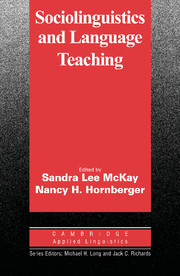Book contents
- Frontmatter
- Contents
- List of contributors
- Series editors' preface
- Preface
- Acknowledgements
- Part I LANGUAGE AND SOCIETY
- 1 Language attitudes, motivation, and standards
- 2 Societal multilingualism
- 3 World Englishes
- 4 Language planning and policy
- Part II LANGUAGE AND VARIATION
- Part III LANGUAGE AND INTERACTION
- Part IV LANGUAGE AND CULTURE
- CONCLUSION
- Index
3 - World Englishes
Published online by Cambridge University Press: 22 July 2009
- Frontmatter
- Contents
- List of contributors
- Series editors' preface
- Preface
- Acknowledgements
- Part I LANGUAGE AND SOCIETY
- 1 Language attitudes, motivation, and standards
- 2 Societal multilingualism
- 3 World Englishes
- 4 Language planning and policy
- Part II LANGUAGE AND VARIATION
- Part III LANGUAGE AND INTERACTION
- Part IV LANGUAGE AND CULTURE
- CONCLUSION
- Index
Summary
Introduction
This chapter provides an overview of the topics and relationships of sociolinguistics, world Englishes, and language teaching. Although the more specific TESL cannot be equated with the more general enterprise of language teaching, still there is undoubtedly more international teaching, materials production, and published thought in TESL than in any language of wider communication, such as Arabic, French, Hindi, or Spanish. Language teachers can readily generalize from research in and hypotheses about TESL. And similarly, although no one would want to make a comparison between what is going on with and what is studied about English and the field of sociolinguistics, the language has rightly been called “the great laboratory of today's sociolinguist” (Kahane & Kahane, 1986, p. 495). That is, what applies to global English is most often found to apply to other language situations involving languages of wider communication.
In this chapter, then, we will usually refer to world Englishes and the teaching of English; it should, however, be understood that the observations and analyses here will have relevance to sociolinguistics and to teachers of languages of wider communication. All these languages (e.g., Arabic, French, Hindi, or Spanish) have more than one accepted standard and set of norms for creativity, and thus are termed pluricentric languages. Because the term world Englishes, and its meaning, may not be familiar or transparent, its sources and features will be briefly described.
Information
- Type
- Chapter
- Information
- Sociolinguistics and Language Teaching , pp. 71 - 102Publisher: Cambridge University PressPrint publication year: 1995
Accessibility standard: Unknown
- 32
- Cited by
